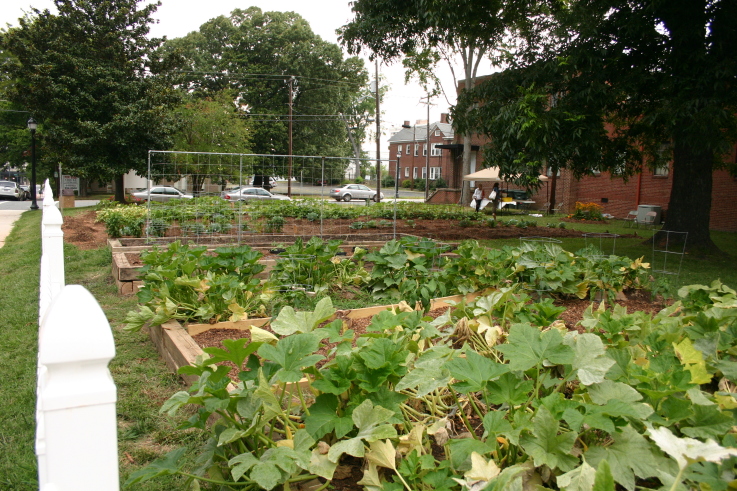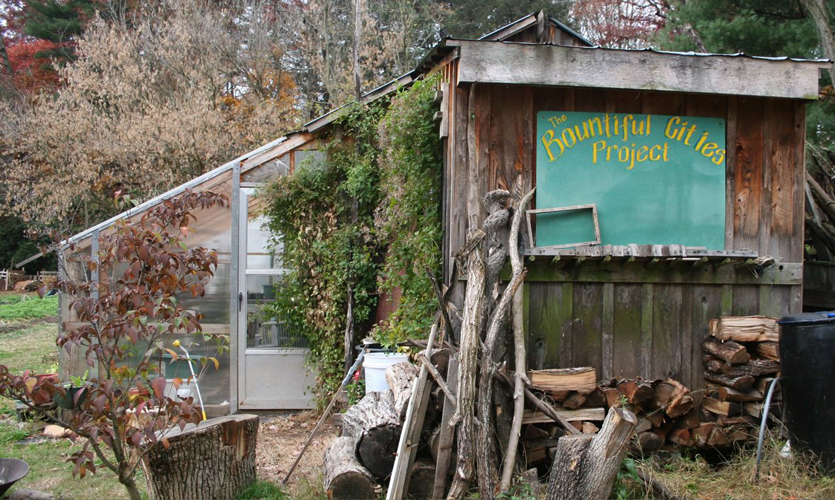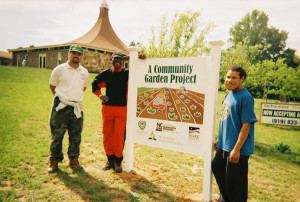Community Gardens Funding Opportunities
go.ncsu.edu/readext?240935
en Español / em Português
El inglés es el idioma de control de esta página. En la medida en que haya algún conflicto entre la traducción al inglés y la traducción, el inglés prevalece.
Al hacer clic en el enlace de traducción se activa un servicio de traducción gratuito para convertir la página al español. Al igual que con cualquier traducción por Internet, la conversión no es sensible al contexto y puede que no traduzca el texto en su significado original. NC State Extension no garantiza la exactitud del texto traducido. Por favor, tenga en cuenta que algunas aplicaciones y/o servicios pueden no funcionar como se espera cuando se traducen.
Português
Inglês é o idioma de controle desta página. Na medida que haja algum conflito entre o texto original em Inglês e a tradução, o Inglês prevalece.
Ao clicar no link de tradução, um serviço gratuito de tradução será ativado para converter a página para o Português. Como em qualquer tradução pela internet, a conversão não é sensivel ao contexto e pode não ocorrer a tradução para o significado orginal. O serviço de Extensão da Carolina do Norte (NC State Extension) não garante a exatidão do texto traduzido. Por favor, observe que algumas funções ou serviços podem não funcionar como esperado após a tradução.
English
English is the controlling language of this page. To the extent there is any conflict between the English text and the translation, English controls.
Clicking on the translation link activates a free translation service to convert the page to Spanish. As with any Internet translation, the conversion is not context-sensitive and may not translate the text to its original meaning. NC State Extension does not guarantee the accuracy of the translated text. Please note that some applications and/or services may not function as expected when translated.
Collapse ▲There are lots of ways to raise money to support your garden: grants, special events, sales, fees, donations, sponsorship and many more. There are also a myriad of ways to market the garden: Health, Nutrition, Exercise, Community Development, Stormwater Management, Education, Science, Art, etc. Below are some ideas to get you started.
Learn About Fundraising
Fundraising for Community Gardens by Gary Goosman (PDF), American Community Gardening Association
Funding Sources
Adopt-a-Garden
Foster partnerships between businesses, service organizations, universities or community colleges, etc. Contact the local Chamber of Commerce to identify potential partners. Look to the parents of the children who garden for support from their businesses.
Captain Planet Foundation
Details: Captain Planet Foundation
Deadlines: March 31, June 30 September 30, and December 31
Committed to supporting hands-on environmental projects for young people, the foundation provides grants from $250 to $2,500 to school and community groups.
Community Development Block Grants
Federal funds are given to the cities to use to meet local priorities and needs. $500 – $50,000 available for one program. Contact your local Mayor’s office for information and application procedures. Involve community gardeners in the process of securing funds. They can attend council meetings and write letters to successfully lobby for city block grant money for their gardening program.
Community Foundations
A community foundation uses donated funds to establish and build an endowment to benefit a specific geographic area. Like other nonprofits, a community foundation is led by an independent board of directors that represents the community it serves. A list of community foundations in North Carolina is available from the Grantsmanship Center.
Donations
Develop a budget and a specific wish list. Form a plan for raising the money including a list of potential donors, what you will request, who will do the asking, how donors will be recognized and involved in the project, and how you will express your appreciation.
Donors Choose
Details: Donors Choose grants
Eligible: Schools
Teachers all over the U.S. need your help to bring their classroom dreams to life. Choose a project that inspires you and give any amount.
Dunspaugh-Dalton Foundation
Details: Dunspaugh-Dalton Foundation grant (note: site last updated 2018)
Eligible: 501(c)3 in Miami-Dade County, Florida, Monterey County, California or Charlotte/Mecklenburg County, NC
Amount: $5,000 to $50,000
Priorities: civic affairs, youth, education, social services
Environmental Protection Agency
Details: Grants and Environmental Education Grants
Garden Clubs
https://gardenclub.org/
National Garden Clubs has attained its status as the largest volunteer 501(c)(3) organization of its type in the world by the excellence of its programs and its focus on effectively addressing current issues and trends.
The Grantsmanship Center
http://www.tgci.com/
Training Opportunities, Free Magazine, Nonprofit Resources, Publications, and more.
Home Depot
The Home Depot Foundation: Community Impact Grants
The Foundation offers grant awards up to $5,000 to 501(c)(3) designated organizations (recognized and in good standing with the IRS for a minimum of one year) and tax-exempt public service agencies in the U.S. that are using the power of volunteers to improve the community. Grants are given in the form of The Home Depot gift cards for the purchase of tools, materials or services and are required to be completed within six months of approval date.
John S. and James L. Knight Foundation
Details: Grants from John S. and James L. Knight Foundation
A national foundation with local roots seeking opportunities that can transform both communities and journalism, and help them reach their highest potential. Funding priorities include: Education; Well-being of children and families; Housing and community development; Economic development; Civic engagement/positive human relations; Vitality of cultural life
Deadline: None; Eligible: Government or 501(c)(3)
John Rex Endowment
Details: John Rex Endowment
Focus Areas:
- Children’s positive social, emotional, and behavioral health and well-being
- Nonprofit Capacity Building
Eligible: Government Agencies, 501(c)(3) nonprofits in Wake County, NC
Kroger Co. Foundation
Details: Submitting a foundation grant request
Eligible: 501(c)(3)s in communities where Kroger customers and associates live and work.
Priorities: Zero Hunger Zero Waster; Health & Nutrition; Stronger Communities
Lorrie Otto Seeds for Education Grant Program
Details: Wild Ones Native Plants, Natural Landscapes
Eligible: Schools, non-profits and not-for-profit places of learning in the United States with a site available for a stewardship project. Successful non-school applicants often are a partnership between a youth group (scouts, 4-H, etc.) and a site owner. Libraries, government agencies, and houses of worship are eligible subject to youth participation.
Priorities: Wildflower pollinator gardens, rain gardens, wildlife habitat.
Amount: Up to $500
The National Education Association
https://www.neafoundation.org/educator-grants-and-fellowships/
A variety of grants programs to support teachers doing innovative work
National Environmental Education and Training Foundation
http://www.neefusa.org/
Eligible: 501(c)(3) serving children in the US, Must not discriminate, Preference to those with a budget under $1 million.
Priorities: Creating Awareness, Education, and Action in Support of the Environment, Connecting Youth with Public Lands as places for recreating, learning and volunteering. Hands-On, Outdoor engagement, Environmental Stewardship.
Funding: $5.000 to $40,000 for Specific Program or Operations
Match: 1:1
National Gardening Association
https://garden.org/
Offer a variety of grants changes year to year depending on sponsors. Check their website for current offers.
Youth Garden Grants Program
National Science Foundation
http://www.nsf.gov/
Attention Grants and Agreements
North Carolina Native Plant Society
B.W. We
Eligible: Community Organizations projects that feature NC native plants
- install native plant or pollinator gardens,
- restore and maintain natural plant communities or
- develop educational materials related to native plants and their habitats.
Amount: $1,000
Deadline: Due September 1
North Carolina Office of Environmental Education
http://web.eenorthcarolina.org/net/content/search.aspx
List of grants for gardens, physical activity, and outdoor projects
Peter F. Drucker
Details: Drucker Institute
Eligible: US 501(c)(3)
Amount: 1st Place $35,000, 2 Runner-ups of $7,500 & $5,000
Deadline: Usually due in July, Awarded in November
Project Learning Tree Green Works!
Details: Greenworks Grants for environmental education
Eligible: Must have attended a PLT workshop, involve service-learning have a community partner
Priorities: school/community native plant garden, forest improvement project, streamside restoration plan, recycling program, or energy conservation project for students
Amount: up to $1,000 or up to $3,000 if registered PLT School (free online registration)
Match: 50%
Public Welfare Foundation
The Public Welfare Foundation supports efforts to ensure fundamental rights and opportunities for people in need. It looks for carefully defined points where its funds can make a difference in bringing about systemic changes that can improve the lives of countless people.
Southern Region IPM Center
Details: Grant programs
Southern Region Sustainable Agriculture Research and Education
Details: Southern SARE Grants
Eligible: Any person or organization with an idea that will link sustainable agriculture activities to healthy rural community development.
Amount: Up to $10,000, can be spread over two years.
Call for Proposals
USDA: National Institute of Food and Agriculture
Details: Community Food Projects (CFP) Competitive Grants Program
Eligible: Private Non-Profit Entities Meeting specific requirements as listed in the Request for Applications
Amount: $10,000 – $300,000
Matching: 1:1
Priorities: Community Food Projects should be designed to
- (A) meet the food needs of low-income people; (B) increase the self-reliance of communities in providing for their own food needs; and (C) promote comprehensive responses to local food, farm, and nutrition issues; and/or
- meet specific state, local, or neighborhood food and agriculture needs for (A) infrastructure improvement and development; (B) planning for long-term solutions; (C) the creation of innovative marketing activities that mutually benefit agricultural producers and low-income consumers or (D) Food Security Learning Center to support a grant to a non-governmental organization (NGO) to establish and operate a national information and education clearinghouse on community food security.
Due Dates: May
Wells Fargo Environmental Solutions for Communities
Details: Environmental Grant Programs
Eligible: 501(c)(3) organizations, governmental agencies, public schools
Amount: $25,000 – $250,000
Matching: 1:1 match preferred
Priorities: Projects that positively impact the environment. Sustainable agriculture and forestry, water quality, land conservation, and healthy urban ecosystems.
Due Dates: Varies – usually July and December
Whole Foods – Whole Kids Foundation
Details: School Garden Grant Program
Garden Resource Center, Salad Bars in Schools, Nutrition Education for Teachers,
Youth Service America
Details: Youth Service America programs
Eligible: Schools and Organizations planning service projects to be implemented by 5-18-year-old youth.
Amount: 150 $500 grants
Matching: None required
Priorities: The goal of each grant is to inspire children to work with their families, friends, schools, and communities to address critical environmental needs in their local, national, and global communities.
Z Smith Reynolds
Details: Z. Smith Reynolds Foundation grants
Eligible: 501 (c)(3) organizations and government entities for programs and projects serving the people of North Carolina
Amount: Up to $35,000 per year for one or two years, larger amounts available
Matching: None required
Priorities: The Foundation focuses its grantmaking on five Focus Areas: Community Economic Development, the Environment, Social Justice and Equity, Democracy and Civic Engagement, and Public Education.
Due Dates: February and August
Contact: Info@zsr.org,
Phone: 336.725.7541
Awards
Take time to apply for awards that give your program creditability, recognize your participants, and create media opportunities for you to promote your program.
Great American Gardeners Award
Recognizes horticultural heroes who have made a significant contribution to American Horticulture.
Resources:
- Benevon – Creating Sustainable Funding for Nonprofits
- Blue Avocado – Practical, Provocative, and Fun Food-for-Thought for Nonprofits
- Council on Foundations
- Fired Up Fundraising – Strategies for Changing the World
- Foundation Center
- Grants.gov
- North Carolina Environmental Education Grants – NC DENR Office of Environmental Ed & Public Affairs
- Sam.gov – The official U.S. government website for people who make, receive, and manage federal awards.
- Shoestring the nonprofit’s agency
- Southern Rural Development Center – Grant Connections





